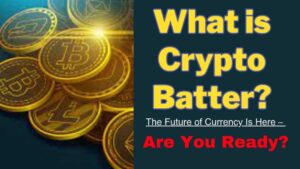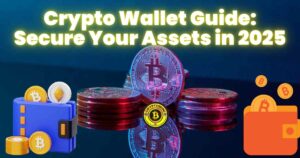In this article , We are going to discuss about NFT Scams , 7 types of NFT Scams, 11 ways to protect yourself from the probale NFT Scams and you can also clear your doubts through the FAQs provided in the article . Let’s start the journey…
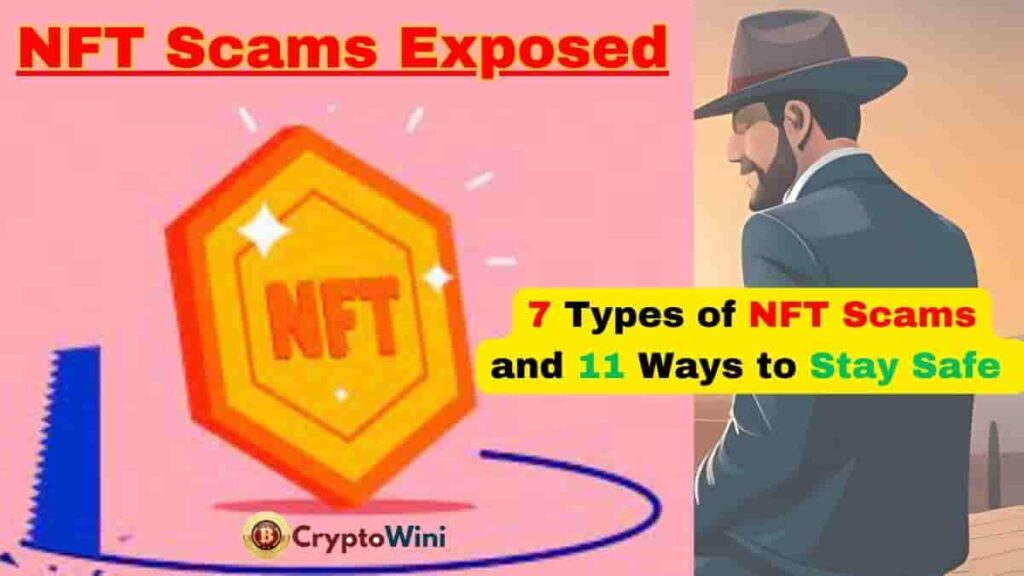
NFT Scams Uncover Crypto Insider Trading, Raise Regulatory Questions
In the ever-evolving realm of cryptocurrency, a recent revelation has sent ripples across the digital asset community. An insider trading scheme within a prominent NFT marketplace has come to light, prompting concerns about the NFT market’s integrity and emphasizing the need for robust regulatory frameworks in the world of cryptocurrency.
NFT Scams : Navigating the NFT Landscape
When most folks think of Non-Fungible Tokens (NFTs), they often envision dazzling digital artworks fetching staggering sums at high-profile auctions. While this perception isn’t entirely off base, it barely scratches the surface of the diverse NFT landscape.
Rob Nelson, a respected figure in the cryptocurrency sphere and host of the Roundtable, kickstarted an essential discussion by shedding light on the public’s limited grasp of NFTs. For many, NFTs are primarily seen as tools for artists to create and sell digital art, sometimes at seemingly sky-high prices. However, beneath this initial impression, lies a world filled with untapped possibilities.
Drawing Parallels with E-Commerce Giants
To demystify the intricacies of the NFT universe, Nick Mancini, Director of Research at Trade The Chain, drew a compelling parallel. He likened OpenSea, the leading NFT marketplace, to the global e-commerce giant, eBay. While eBay caters to a vast array of products and involves transactions that can take days to conclude, OpenSea provides a streamlined experience exclusively for NFTs, where transactions happen in a matter of seconds.
NFT Scams : Exploring Uncharted NFT Territory
Nonetheless, the heart of the conversation delved into the uncharted waters of NFTs. Nelson posed a thought-provoking query: Could NFTs expand their reach beyond the realm of digital art and establish a presence in mainstream financial markets, akin to stocks or futures?
Alex Mascioli, the founder of Trade The Chain, offered insights into this intriguing possibility. He traced the transformative journey of NFTs, from their humble origins on self-minting JPEG platforms to their current status as substantial digital assets. Mascioli underlined the entry of luxury brands, such as Porsche, into the NFT realm. These brands are no longer constrained to merely selling digital images; they’re packaging tangible value into NFTs, offering ownership privileges, musical rights, and more.
NFT Scams : The Shadow of Insider Trading
Nevertheless, the NFT journey is not without its hurdles. A recent incident involving an OpenSea staff member facing insider trading allegations has stirred controversy. Mascioli voiced deep concerns about this incident, highlighting the regulatory uncertainty that hangs over the NFT space. He drew a parallel with a hypothetical scenario: What if an employee at a baseball card factory cherry-picked premium cards before they hit the market? Would that be deemed unlawful?
Nelson’s concluding remarks broadened the perspective. Could the OpenSea incident be compared to potential insider trading activities in more established arenas, such as the halls of Congress?
Types of NFT Scams
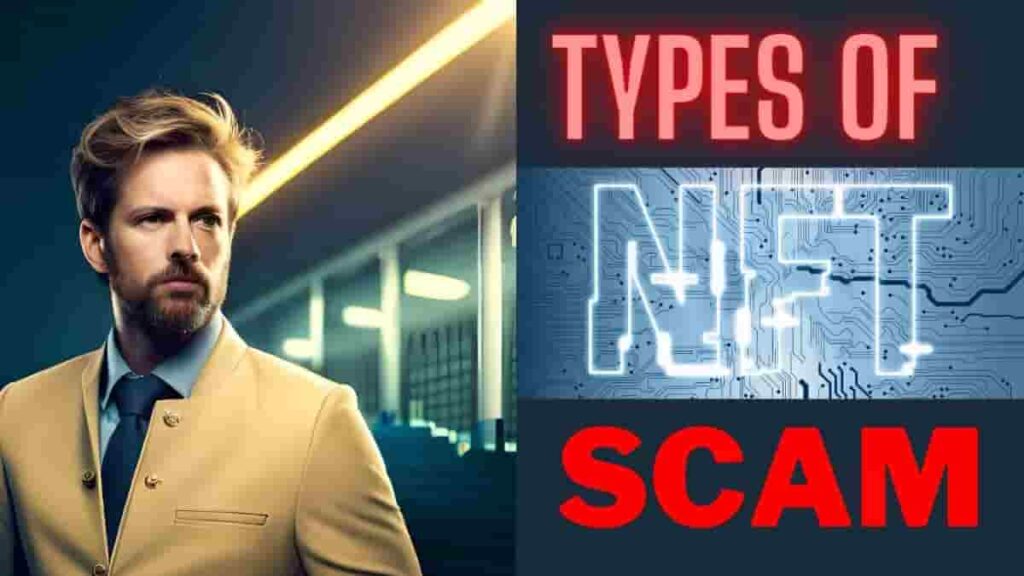
Now I am going to explain seven common NFT scams and how they work. Learning about these scams will help you keep your investments safe when dealing with NFTs:
(1) Rug Pull Scams: The Deceptive Disappearance
Rug pull scams have become a haunting reality in the NFT world. Scammers create hype around a fake NFT or project, attracting unsuspecting investors. Once they’ve amassed their loot, these fraudsters vanish into thin air, leaving investors high and dry. An example of this is the infamous Frosties NFT collection, where the Discord server disappeared, and the project folded, leaving thousands in despair.
In the words of expert Donarski, “Rug pulls are big business for today’s attackers.” This highlights the importance of due diligence before investing in any NFT project.
(2) Phishing: The Web of Deceit
Phishing scams are another common menace in the NFT realm. Scammers employ fake ads, emails, and popup advertisements to lure victims to fraudulent websites. These deceptive platforms often trick users into revealing their crypto wallet information, resulting in the theft of NFTs and cryptocurrency. Beware of direct messages on social platforms, as they are breeding grounds for such scams.
(3) Airdrop/Giveaway Scams: The Illusion of Generosity
NFT giveaways might seem like a generous offer, but scammers use social media to promote them. They encourage people to spread the word or sign up on their website in exchange for a free NFT. When it’s time to claim the reward, victims are asked for their crypto wallet information, which ultimately leads to the theft of assets. One notorious case involved a fake Rarible site promising five times the amount of RARI cryptocurrency for a small deposit, only to disappear with investors’ funds.
(4) Impersonation/Catfishing: Posing as the Stars
Impersonation and catfishing scams are a cunning strategy employed by scammers. They create fake social media profiles and spam websites, often imitating real artists or celebrities. Some even pose as tech support, luring victims into revealing their credentials. Tom Brady, Mike Tyson, and Kim Kardashian are among the celebrities whose likenesses are frequently targeted for bogus NFTs.
(5) Pump and Dump Scams: Riding the Wave of Deception
Pump and dump scams involve artificially inflating the price of a cryptocurrency through coordinated buying, only to sell off at the peak, leaving others with substantial losses. Influencers, like the esports organization FaZe Clan, have been implicated in such schemes, promoting cryptocurrencies that later plummet in value.
(6) Counterfeit/Plagiarized NFTs: The Art of Deception
Counterfeit NFTs are a serious concern. Criminals copy original artwork and sell counterfeit versions on reputable marketplaces, leaving buyers with worthless tokens. In one audacious case, a hacker known as Monsieur Personne created copies of Beeple’s “Everydays: The First 5000 Days,” selling them for a fraction of the original’s value.
(7) Bidding Scams: Tricking the Highest Bidder
Bidding scams target NFT sellers. Scammers become the highest bidders but switch to a lower-value cryptocurrency when it’s time to pay. To avoid falling victim, always verify the currency the highest bidder is using before accepting the bid.
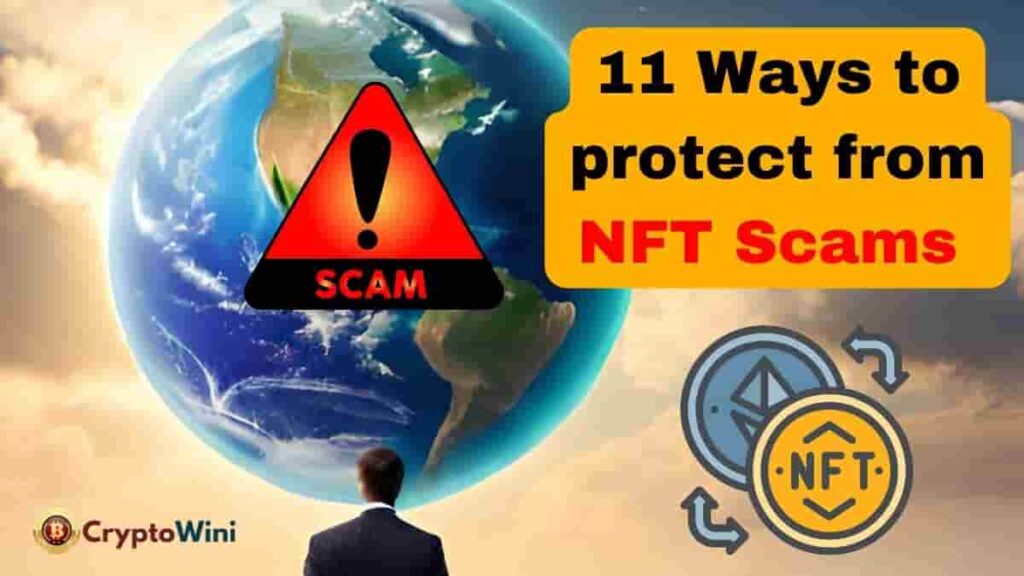
How to Avoid NFT Scams : 11 Ways to protect from NFT Scams
Here is the 11 ways to avoid or protect from NFT Scams which You must adhere to while you are dealing with The NFTs . Therefor To protect your NFT investments, follow these crucial steps:
1. Keep Your Logins Private
Never share your crypto wallet information with anyone. Safeguard your seed phrase or private key like a treasure.
2. Use Two-Factor Authentication
Enable two-factor authentication for your accounts to add an extra layer of security.
3. Consider Cold Storage Wallets
Store your cryptocurrency in cold storage wallets to shield it from online threats.
4. Beware of Suspicious Messages
Avoid engaging with suspicious messages, emails, or websites. They may be phishing attempts.
5. Employ Security Tools
Anti-virus and anti-malware tools, along with virtual private networks (VPNs), can fortify your devices against threats.
6. Research Sellers and Websites
Do your own research (DYOR) before engaging with NFT sellers and platforms. Look for verification marks and read reviews.
7. Investigate an NFT’s History
Check an NFT’s transaction history and compare prices on various marketplaces.
8. Use Reputable Marketplaces
Stick to well-established and secure NFT marketplaces to minimize risks.
In the dynamic world of NFTs, staying vigilant and informed is paramount. Protect your digital investments by recognizing and avoiding these seven types of NFT scams.
9. Set Up Price Alerts
Utilize cryptocurrency tracking apps or platforms that allow you to set up price alerts for your NFT holdings. This way, you can stay informed about any significant price fluctuations and take timely action, such as selling or securing your assets, in response to market changes.
10. Diversify Your NFT Portfolio
Avoid putting all your resources into a single NFT or project. Diversifying your NFT portfolio across various assets can help spread risk. If one investment faces difficulties or scams, it won’t have as significant an impact on your overall holdings.
11. Stay Informed About Regulatory Changes
Keep an eye on the evolving regulatory landscape surrounding cryptocurrencies and NFTs in your region. New regulations can affect the legality and security of your investments. Staying informed and compliant with local laws can help you avoid legal issues and safeguard your assets.
By incorporating these additional safeguards, you can enhance the security and resilience of your NFT investments in an ever-changing digital landscape.
Frequently Asked Questions (FAQs)
If you have doubts related to NFT and NFT Scams , These FAQs will surely help you to clear your doubts and to protect yourself from the probale NFT Scams:
Q. What is an NFT?
An NFT, or Non-Fungible Token, is a unique digital asset that represents ownership or proof of authenticity of a specific item or piece of content, often stored on a blockchain.
Q. Why is the recent NFT insider trading incident significant?
The incident highlights the need for regulatory oversight in the NFT market and raises questions about the integrity of the space.
Q. How are luxury brands getting involved in NFTs?
Luxury brands are using NFTs to offer ownership benefits and additional value beyond digital imagery, such as music rights and exclusive perks.
Q. What challenges does the NFT market face in terms of regulation?
The NFT market currently lacks clear regulatory guidelines, leading to ambiguity and potential issues like insider trading.
Q. What is the future of NFTs in mainstream finance?
The future of NFTs in regular finance is a bit unclear, but there’s potential for them to become more than just digital art.
Q. How can individuals who invest safeguard themselves against potential NFT scams?
Alright, let’s talk about how people who invest can protect themselves from potential NFT scams.
Here’s what they can do to stay safe:
- Do Smart Research: Take a good look at NFT projects and where they’re sold. Be thorough and make sure what you’re buying is the real deal, not something fake.
- Watch Out for Too-Good Deals: If an offer sounds incredibly amazing, it might be a scam. So, don’t rush into anything that feels suspicious.
- Stay Updated: Keep an eye on the latest NFT news. If something doesn’t seem quite right, you’ll be more likely to notice it.
By following these steps, investors can lower the chances of falling for scams and keep their investments safe and sound.
Q. Are there any tax implications associated with owning and trading NFTs?
Let’s delve into the realm of taxes in the world of NFTs. Think of it as piecing together a complex puzzle, where the tax rules can differ based on your geographical location. So, if you’re holding onto NFTs, it’s crucial to determine the tax regulations that apply to your specific situation. Occasionally, when you decide to part ways with your NFTs and make a sale, you might find yourself setting aside a portion of your earnings for something called “capital gains tax.” To ensure you’re on the right side of the tax code, it’s a prudent move to diligently maintain comprehensive records of all your NFT transactions.
However, if the whole tax-NFT situation leaves you feeling bewildered, it’s a wise decision to have a conversation with a tax expert or an accountant. They can offer personalized guidance and assist you in navigating the intricate tax landscape concerning NFTs.
Conclusions For NFT Scams
In summary, the NFT landscape is a dynamic one, evolving swiftly with untapped potential, opportunities, and, as we’ve witnessed, challenges. As this market continues to mature, the urgency for regulatory clarity and a comprehensive understanding grows. Only time will unveil the true heights NFTs can attain. However, one thing remains certain: their journey promises to be both captivating and transformative.We must be cauution and should take th enecessary steps to protect ourselves from NFT Scams.
Read More
What is a smart contract? Unlocking the Potential of Smart Contracts: A Beginner’s Guide
Shibarium and Shiba Inu: The Dynamic Duo Shaping Cryptocurrency in 2023!




